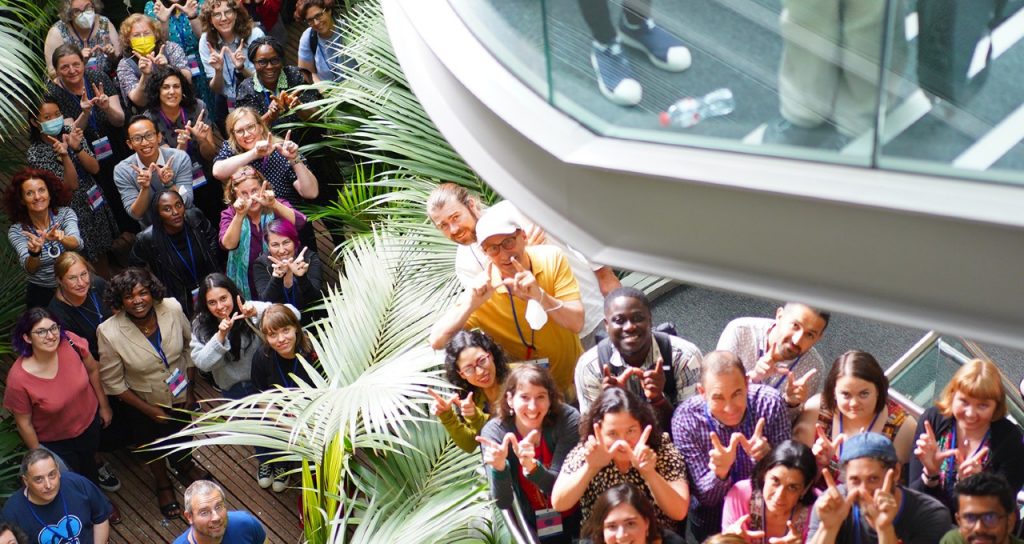Last July I had the opportunity to attend the first Wikimedia+Libraries International Conference (@WikiLibCon #WikiLibCon22), fantastically organized by Núria Ferrer-Ferrán (@nferranf) and Laurie Bridges (@LaurieMBridges). Núria had attended one of the sessions of the Wikiesfera working group to tell us about the research she is conducting on the gender gap in Spanish Wikipedia at the University of Barcelona, and invited me to this conference. Two intense days in a privileged space: the Campus of the Maynooth University west of Dublin, in Ireland, with incredible facilities in both the new and old parts, and a much nicer time than the brutal heat we were living in Spain.
Although there were people from the Wikimedia Foundation and other Wikimedians who have participated in congresses of the movement in which I have also been, I did not know anyone but I felt very integrated in the group from the first moment. I was able to listen to different people from the world of libraries from different countries and their experience as part of the Wikimedia movement. The Inaugural Session Wikimedia through the prisms of critical librarianship, a presentation by Nkem Osuigwe (@librarian_nkem) where he reflected on the importance of libraries in our towns and cities, and their responsibility as guarantors of an open and diverse culture, I found it particularly brilliant and inspiring. Above all, in a moment as delicate as the one we are living: with rights cuts, proliferation of false information, historical relativism and revisionism, ... and when we are seeing how libraries are the target of far-right groups that want to limit access to knowledge, as is happening in the United States (Book bans are threatening American democracy).
They were stimulating sessions and, although I could not attend all of them, as there were several simultaneous ones (as happens in all meetings of this type), I was able to collect interesting ideas to propose to my working group. I returned to Spain very happy and with renewed energy, and that helped me to reflect on certain aspects:
- The PRESENTIAL encounters are essential to generate community even among people who do not think alike. When we only relate through a screen it is very difficult to empathize when there are discrepancies, and we tend to dehumanize ourselves. We have to look more and we need to be able to do it without limitations such as language: Diversity is necessary and the tools to understand each other in these diverse contexts are fundamental.
- Libraries are vital spaces for millions of people around the world, they are places where the FREE ACCESS TO KNOWLEDGE. Let's work for these institutions to play an important role in the Wikimedia movement, as the campaign tries to do. #1lib1ref y #1bib1ref (in Spanish) for years.
- When we do not find valid references to build articles on Wikipedia, we must generate alternative documentation, preventing the culture of ORAL TRADITION from disappearing when our elders are gone. That is why it is important to know projects such as Wikisource where we can perform this intermediate step, guaranteeing the conservation of our memory.
- Wikipedia must be part of EDUCATION as a valuable tool for students, but not only as a consultation space. It is necessary to involve the institutions and the teachers, and to see the amount of competences that are acquired by being Wikipedians: search for information, selection of relevant data, agile reading and writing...
- We need investigations like that of David Ramirez-Ordonez (@hyperterminal) within the project Where are the women on Wikipedia to analyze how it is and how the GENDER GROUND is produced on Wikipedia, which is still a reflection of the existing biases in society. The media must be involved to make the work of many more women visible.
- HUMOR is fundamental: to deal with aspects of life but also to bring knowledge closer and arouse the curiosity of many more people. Ideas like the ones on the account @depthsofwiki created by Annie Rauwerda (@anniierau) help us demystify the work we do on Wikipedia and not take ourselves so seriously ⁇

The post-pandemic world is harder and more complex than before. That is why it is essential support each other as we strive to live in one where social justice and equal opportunity remain unwavering principles. WE NEED US to move forward and help grow as many positive and constructive projects as we can. Hopefully from Wikiesfera we can organize a meeting of these characteristics to imbue the spirit of the Wikimedia movement to many more people.


